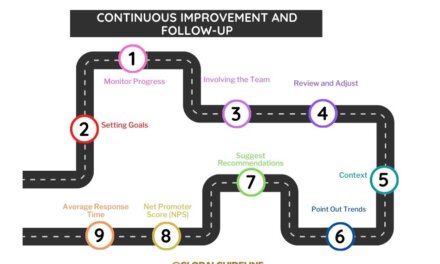This is a very important factor in the achievement of success in both personal and professional life-the ability to always take a lead. Leadership has nothing to do with just holding a power position because, basically, it has to do with stepping forward, making choices, and leading other people toward a common end. The setting may be a job, a relationship, or any other way of life, but taking the lead can have great impacts on your journey toward success. So let’s talk about the top 5 reasons always to take a lead for success. Now, we are going to clear up why this is so important and how it can be your stepping stone in your career and life.
Table of Contents

1. Taking the lead demonstrates initiative and responsibility.
One of the fundamental reasons for taking the lead at all times is that it shows initiative and responsibility—two qualities so valued in any setting. Taking the lead does not mean waiting for someone to tell you what to do; on the contrary, it’s an act of taking charge to make decisions and act.
What Does Always Take the Lead Mean?
It is a situation whereby one takes the leading role always, meaning one should be proactive and ready to accept any challenge at any moment so long as there is an opportunity to head towards the right direction. It also means taking charge of situations while leading others to be sure about the accomplishment of objectives.
Why Initiative is Important
The campaign marks an important step to show to one’s employer that one is not there just to hear and do what they say, but an active partner who will take a challenge or be responsible for the outcome of issues. Working with people who can go the extra mile and take ownership of outcomes are valued both within and outside the workplace.
Example: In a project environment, leadership may mean the act of assembling a team of individuals and other duties assigned to carry out a particular aim. In so doing, you put yourself in a core position for the success of the project.
How Responsibility Drives Success
Responsibility brings ownership of your actions and the consequences that they therefore create. It aids in developing trust and reliance as cornerstones of long-term success. When you’re the leader each time, that indeed shows you are responsible for the messes you apparently create, and it might just open more doors in your career and further into your professional life.
2. Improves Leadership Skills in Problem-solving and Decision-making
Leadership comes along with problem-solving and decision-making skills. While one is at the helm of affairs, he needs to face problems and has to make crucial decisions so that the outcome of a project or a situation could be taken up properly.
Why Is Taking the Lead Important?
Why is taking the lead important? It becomes important because leaders are always presented with hard problems that demand thinking and acting fast. In this respect, taking the lead positions you as a person who can handle the challenges in an effective way.
Problem Solving in Leadership
Effective problem-solving is one of the most important skills any leader must exhibit. It involves the analysis of situations, recognition of potential roadblocks they may face, and ways to solve them for their mutual benefit. Value leaders who effectively solve problems are worth it. They keep things moving amid difficult circumstances.
For example, a leader may need to react to a sudden drop in team morale. By being a leader, they can formulate ways to motivate the employees better. They might design team-building events or give special attention to weaker staff members.
Leadership Decision Making
Another large part of leading is deciding. If you lead there are times to make up or come up with a decision for yourself and others. The quality of good decision-making involves weighing pros and cons as well as considering the impact on all stakeholders with an awareness of a better course of action.
Taking the lead synonym: Taking initiative, spearheading, leading the charge, or stepping up are all synonyms that reflect the essence of taking the lead in a decision.
3. Taking the Lead Builds Confidence and Credibility
Confidence and credibility can play a huge role in both professional and personal life. When you always take a lead, you build both, enhancing your ability to influence and inspire others.
How Leadership Builds Confidence
It actually takes a degree of confidence to lead, but what really builds up the confidence is being in the position of leadership. You begin to receive more confidence in your ability as you start guiding others and playing out leadership roles to success. That self-assurance also counts in continuing to succeed because it allows you to be able to do more challenging tasks.
Meaning: I’ll take your lead Every time you say, “I’ll take your lead,” it simply means that you trust them to follow your lead. As a result, such trust comes from the confidence that you build through such consistent leadership.
Credibility Through Consistent Leadership
Credibility is established by action. Constantly taking the lead and having good results builds up a reputation as being one who can be entrusted to get prepare for the job interview. Such credibility opens doors to new opportunities as others seek you for your guidance and leadership.
Examples: In business, individuals with a consistent record of leads that can push projects to full success will gain validity from peer and superior ranks while further expanding their scope for upwards promotion and career progressions.
Career Advancement Implication
To begin with, I want to say that career advancement depends much on the factors of confidence and credibility. In a word, nobody will give a leader position or any other promotion for a person who is not sure about his abilities in any sphere: the person is usually not credible in the society, which does not consider him or her for different advanced positions.
4. Leadership Encourages Growth and Learning
Leadership is one of the strongest tools to lead as well as to direct others, but it’s also about moving along as well as learning. Taking the lead pushes an individual out of his comfort zone most of the time; this leads to truly outstanding personal and professional development.
Why does lead matter for growth?
Why do people need lead? Leadership is important because it inspires lifelong learning and growth. Leaders always undergo various challenges that require them to develop new skills, adapt to new situations, and develop from these experiences.
Growing Through Leadership Challenges
Whatever the leadership, problems are to arise anyway. Essentially, these problems promote one’s growth. The very concept of leading, for instance, calls for developing new ways and tools to achieve effective performance in new surroundings.
Take the lead meaning: This phrase hints at a natural instinct to take up leadership roles, which often brings continuous learning and development as you navigate the odds that come with the role of leadership.
Learning from Experience
One of the most important reasons for taking the lead is the experience gained in the process. Every leadership role that one takes teaches something to apply during the future experiences and challenges. Such a method of experiential learning is a major recipe for eventual success.
A leader who accepts a challenging project and perseveres will gain great insight into management of projects, group dynamics, and problem-solving. These will serve as strengths for upcoming activities.

5. Leadership Inspires and Empowers Others
The greatest reward of leadership is finally related to inspiring and influencing others. One’s always leading and taking initiative in everything encourages the same and inspires others to do the same, creating a feel-good factor that comes far beyond self.
Inspiration in Leadership
Leadership is not solely about managing tasks, but inspiring people to the best. Leading demonstrates some qualities of a good leader, such as determination, resilience, and vision in order to inspire people within your organization to new heights.
What are the 5 qualities of a good leader? The five essential qualities of a good leader are :
- Vision: The ability to view in the large picture and to set a direction.
- Integrity: Acting sincerely with consistency; builds trust.
- Resilience: The strength to cope with failures and difficulties.
- Empathy: Sensitivity to other’s feelings and perspectives towards people’s view point.
- Communication: Expression of ideas and expectations clearly combined with listening.
Influence Through Leadership
Having a leadership position also provides the advantage of having the capacity to influence others. Leaders may define ideas and action, as well as their consequences, within others, both in the professional sphere and in the private relations sphere.
Example: A woman may take leadership in a relationship. She can drive the relationship to where it needs to be while ensuring that it is healthy and balanced for everyone involved. On the same note, an office leader can unite a team and lead them to success if they first list down their goals and motivate others.
Legacy of Leadership
The influence one casts as a leader can truly last an eternity. Through continuous leading, not only will you have achieved what you intended to do, but you will also help others around you get by and grow to be influential for positive change in their own lives and successes.
A real leader always takes u-turns: This phrase really proves that a great leader is flexible and adaptable. They do not mind changing their track when the situation asks for it. That is why true leaders are there to lead in every place and situation.
FAQ Section
Q: What does always take the lead mean?
A: “Always take the lead” means always stepping out to be in positions of leadership, guiding the group, and assuming responsibility for outcomes. He is proactive and sets an example for others.
Q: Is the phrase take the lead correct?
A: Yes, “take the lead” is the correct word usage that is commonly used when referring to becoming leader or heading the way for others in a situation.
Q: Why is taking the lead necessary?
A: One also takes initiative by taking the lead as it demonstrates a proactive attitude, increases confidence and trustworthiness, develops problem-solving and decision-making skills, enables them to grow, and inspires others.
Q: What are 5 qualities of a good leader?
A: Vision, integrity, resilience, empathy, and communication are the five qualities of a good leader.
Q: How can one take the lead within a relationship?
A: A better partner takes charge of how a relationship should go and makes all expectations clear, and communication is also effective. This also calls for making decisions that always benefit the partners and poses as an example in itself.

Conclusion
Taking a lead is to always embrace the opportunities that will come your way, with challenges in being a leader. Taking the lead position can propel a person toward success by showing initiative, raising self-confidence, good problem solving, growth, and inspirational ability.
The more you stand up and take charge, the more you are going to be more noticeable and central to your success as well as the rest’s. Meaning, by embracing the role of a leader, you open your path up to not only personal goals but attainment as a whole.
Finding the right birthday wishes for a colleague is not a difficult task. You can use professional or sincere words, funny lines, or even a personalized message. What is essential here is that your birthday wishes be frank and represent your relationship with the person. Using examples and tips found in this blog post, you will certainly make your colleague’s birthday memorable and contribute to a positive workplace culture.
Remember, a thoughtful birthday wish can warm up the heart of anyone and strengthen professional relationships so take some time to come up with a best possible wish to make your colleague feel truly appreciated.
Related Posts:
7 Ways Performing Manufacturing Operations Boosts Supply Chain Success
10 Channel Management Strategies to Boost Sales USA
What Are the 5 Hidden Things That Sabotage Vision and How to Overcome Them?










